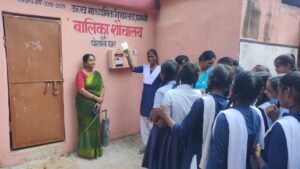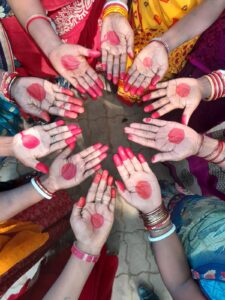At Bhartiya Jan Utthan Parishad (BJUP), we are passionate about empowering underprivileged communities and promoting their integration and inclusion into society. With over four decades of experience in development work, we have focused extensively on improving the quality of life for marginalized populations. One crucial aspect that we prioritize above all else is our dedicated approach to Menstrual Hygiene Management (MHM) in all of our projects where we work with adolescent girls and women. We have implemented evidence-based and innovative strategies to address the specific challenges related to MHM faced by women and girls, ensuring their dignity, health, and empowerment.
Our work begins by engaging directly with the communities we serve. We believe that community empowerment is fundamental to sustainable change. By actively involving local stakeholders and using participa tory techniques, we gain insights into the unique needs and barriers related to MHM in each community. This approach ensures that our interventions are contextually relevant and effectively meet the needs of the people we serve. Education and awareness are powerful tools for breaking down societal stigmas and misconceptions surrounding menstruation. Our initiatives include targeted training sessions for adolescent girls on MHM and life skills. These sessions not only provide practical knowledge about menstrual hygiene but also foster open and enlightened conversations among students, teachers, and parents. By promoting a culture of understanding and acceptance, we contribute to dismantling age-related barriers to MHM.
tory techniques, we gain insights into the unique needs and barriers related to MHM in each community. This approach ensures that our interventions are contextually relevant and effectively meet the needs of the people we serve. Education and awareness are powerful tools for breaking down societal stigmas and misconceptions surrounding menstruation. Our initiatives include targeted training sessions for adolescent girls on MHM and life skills. These sessions not only provide practical knowledge about menstrual hygiene but also foster open and enlightened conversations among students, teachers, and parents. By promoting a culture of understanding and acceptance, we contribute to dismantling age-related barriers to MHM.
We have installed over 25 sanitary vending and incinerator machines in schools across five districts in Bihar as part of our commitment to improving MHM in underprivileged communities. Additionally, serving as the leading partner of the Bihar Jharkhand Sustainable Action on Mica (BJSAM) Consortium across four districts in Bihar and Jharkhand, we lead the initiative to install 20 sanitary vending machines and incinerators. Our efforts include comprehensive orientation, trainings, and allocation of resources to ensure the success and sustainability of these crucial amenities, contributing significantly to improved menstrual hygiene management in the regions. Top of Form
These installations are not just standalone solutions but are integrated into broader projects aimed at improving overall health, water, sanitation, and hygiene (WASH) practices. By providing access to menstrual products and safe disposal methods, we promote hygienic practices and contribute to the well-being of women and girls.
Impact and Results
The impact of our MHM initiatives is tangible and multifaceted:
- We have successfully broken stigma and facilitated open conversations about menstruation within communities, leading to increased awareness among both young girls and elderly women.
- Girls experience increased dignity and comfort during menstruation, which has a positive impact on their overall well-being and self-esteem.

- School attendance rates among girls have seen a notable increase, rising from 60% to 70%, with corresponding improvements in academic performance.
- The adoption of proper menstrual hygiene practices has resulted in a reduced prevalence of urinary tract infections (UTIs) among girls, contributing to better health outcomes.
Our work in MHM goes beyond immediate impact; it lays the foundation for sustainable change. By promoting informed decision-making, inclusivity, and equality, we create lasting benefits for communities. Moving forward, BJUP remains committed to advancing MHM through continued innovation, collaboration with stakeholders, and the pursuit of new, long-term solutions. We invite partners, supporters, and advocates to join us in our mission to ensure that every woman and girl can manage her menstruation with dignity, comfort, and confidence.
